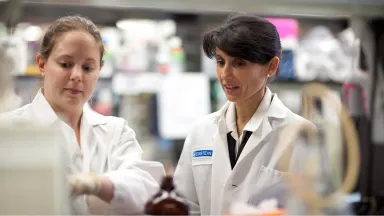
Edward L. Schwartz, Ph.D.
- Professor, Department of Oncology (Medical Oncology)
- Professor, Department of Medicine (Oncology & Hematology)
- Professor, Department of Molecular Pharmacology
Area of research
- Identification of new targets and novel agents to treat lung and prostate cancer.
Phone
Location
- Albert Einstein College of Medicine Jack and Pearl Resnick Campus 1300 Morris Park Avenue Block 614 Bronx, NY 10461
Research Profiles
Professional Interests
The most recent focus of my lab is the discovery of new targets for drug design and development for the treatment of lung cancer. Small cell lung cancer (SCLC) is characterized by aggressive growth, frequent metastases, and the development of chemotherapy resistance. The identification of driver mutations and their corresponding targeted drugs have led to significant improvements in the treatment of many solid tumors; however, similar advances have not been made in the treatment of SCLC. A unique feature of SCLC is the near uniform bi-allelic mutation and inactivation of tumor suppressor genes RB1 and TP53 to drive tumorigenesis. This defining feature of the disease has not led to a targeted therapy, however, since genetically inactivated RB1 and TP53 cannot be reactivated, nor is it feasible to reintroduce the wild-type genes into tumor cells clinically. Our lab is interested in identifying key signaling pathways that are activated in RB1-deficient cells, and then to design and test pharmacologic agents that inhibit these pathways, restoring the lost function(s) of RB1, and causing tumor regressions.
In addition to tissue culture studies, we utilize several animal models of cancer, including genetically-modified mice, to determine the role of key proteins in SCLC tumorigenesis. These approaches help to validate potential gene targets for drug therapy, and to establish the efficacy of established and novel targeted drugs. We also have established collaborations to identify new small molecules that bind to promising regions of the targeted protein and protein complexes. These studies use computational chemistry, in silico modeling, virtual library screening, and medicinal chemistry syntheses. Promising compounds are tested for antitumor activity in mouse and human lung cancer models, with the ultimate objective of developing them as cancer chemotherapy drugs.
Selected Publications
Wang J, Ferrena A, Singh S, Zhang R, Viscarret V, Al-Harden W, Aldahamsheh O, Borjihan H, Singla A, Yaguare S, Tingling J, Zi X, Lo Y, Gorlick R, Schwartz E, Zhao H, Yang R, Geller DS, Zheng D, Hoang B. Targeted inhibition of SCF-SKP2 confers anti-tumor activities resulting in a survival benefit in osteosarcoma. Oncogene 2024; 43:962-975.
Ferrena A, Wang J, Zhang R, Karadal-Ferrena B, Al-Hardan W, Singh S, Borjihan H, Schwartz EL, Zhao H, Oktay MH, Yang R, Geller DS, Hoang BH, and Zheng D. SKP2 knockout in Rb1/p53 deficient mouse models of osteosarcoma induces immune infiltration and drives a transcriptional program with a favorable prognosis. Molecular Cancer Therapeutics, 2024; 23:223-234.
Gupta P, Zhao H, Hoang B and Schwartz EL. Targeting the untargetable: RB1-deficient tumors are vulnerable to Skp2 ubiquitin ligase inhibition. British J Cancer, 2022; 127:969-975.
Wang J, Aldahamsheh O, Ferrena A, Borjihan H, Singla A, Yaguare S, Singh S, Viscarret V, Tingling J, Zi X, Lo Y, Gorlick R, Zheng D, Schwartz EL, Zhao H, Yang DS, Geller DS and Hoang BH. The interaction of Skp2 with p27 enhances the progression and stemness of osteosarcoma. Annals NY Acad Sci, 2021; 1490:90-104.
Zhao H, Iqbal N, Sukrithan V, Nicholas C, Xue Y, Yu C, Locker J, Zou J, Schwartz EL and Zhu L. Targeted inhibition of the E3 ligase SCFSkp2/Cks1 has antitumor activity in RB1-deficient human and mouse small cell lung cancer (SCLC). Cancer Research, 2020; 80:2355-67.




